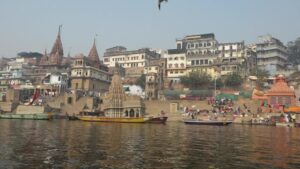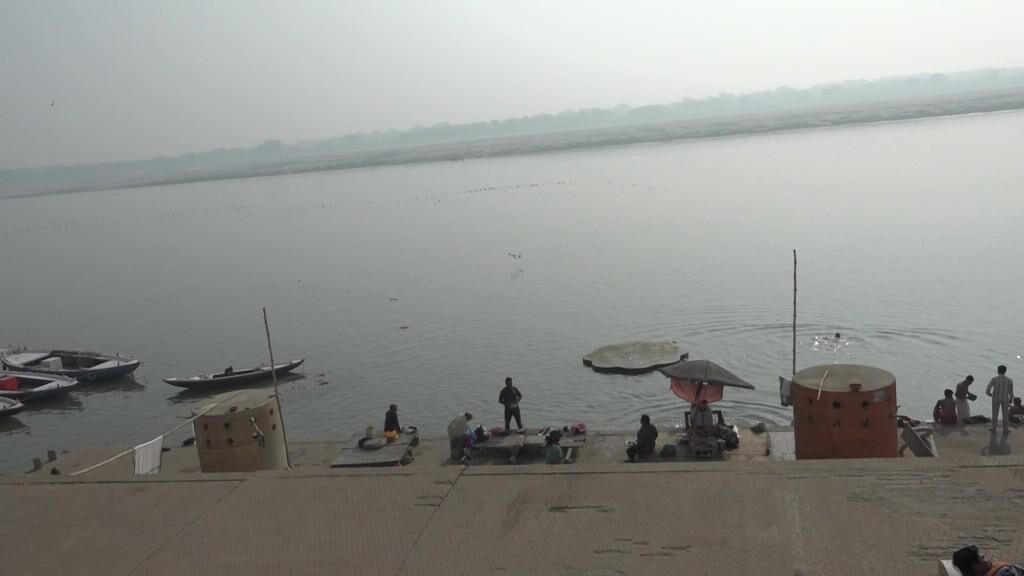RIVER GANGA
Skanda Puran, Kashi Khand has described the importance and divine powers of Holy River Ganga in several chapters. In Chapters 27, 28 and 29 Kashi Khand has amply eulogized River Ganga.

(GANGA RIVER AND GHATS)
Supreme Sage (Raja Rishi) King Bhageerath was suffering from a curse of a Brahmin. He underwent intense penance to Lord Shiva and brought River Ganga to earth. After the deluge, Lord Shiva and Goddess Parvaty appeared on the earth and Lord Vishnu also manifested in Kashi. (Kindly refer to Manikarnika). With his Sudarshan Chakra, Lord Vishnu dug a huge Pond and filled it with his divine perspiration. This Kund came to be known as Chakrapushkarini Teerth. Lord Shiva’s jewel from the ear tops fell in the Chakrapushkarini Teerth and then onwards the Pond used to be called Manikarnika (jewel is referred to as Mani and Karnika means ear). When river Ganga started flowing through Kashi, the Avimukta Kshetra became all the more pious.
River Ganga possesses the religious power of all the Sacred Ponds, Rivers and Lakes in the world put together. A devotee who bathes for even once in River Ganga derives the benefit of bathing in all the Sacred Ponds and performing all rituals elsewhere. It is believed that a person may take his bath anywhere, but at the time of bathing if he utters the words “Ganga, Ganga”, he derives the benefit of bathing in Holy Ganga.

(RIVER GANGA – ANOTHER VIEW)
River Ganga destroys the devotee’s sins committed knowingly or unknowingly. A devotee who always thinks about Holy Ganga while walking, sitting, praying, concentrating, eating or sleeping attains freedom from bondage. A devotee who religiously performs the rituals for his forefathers in Holy Ganga makes his forefathers very happy and they remain satisfied for many decades. Just as worshipping one Shiv Ling gives the benefit of worshipping the entire world, taking bath in River Ganga gives the benefit of bathing in all the Sacred Ponds in the world.
A devotee who bathes in River Ganga and worships Shiv Ling, derives much more benefits than undergoing various rituals like religious fasting, donation, intense penance and austerity, Havans (rituals with fire etc.). Wantingly or unwantingly, if a person touches fire, he will get burnt; similarly wantingly or unwantingly if a devotee bathes in Holy Ganga, the river swallows all his sins.
Please watch our YouTube video about importance of River Ganga in the below Link :
https://www.youtube.com/watch?v=TZExLkMEmCM&t=57s
A devotee gets some amount of Punya by bathing in Ganga, he will derive the same amount of Punya by guiding or directing another person to bathe in Ganga. By bathing once in River Ganga, a devotee derives the benefit of performing Aswa Medha Yagya (horse sacrifice ritual). If a person bathes in Holy Ganga for one month, he will reside with Lord Indra. If a fortunate person bathes in Holy Ganga for a year, he will reach Lord Vishnu’s abode. If a sincere devotee bathes in River Ganga during his entire life, he attains Moksha and highest order in life. For bathing in Ganga one need not observe auspicious time (Muhurat) etc., because no such rules apply for Holy Ganga.
——————————————————————————————————-
Kashi Khand, Chapter 28, Shlok 111
अन्यत्र सम्यक संकल्प्य तपः कृत्वा समा त्रयम्
यत्फलं तद्भक्त्या गङ्गायाम् घटिकाऽर्धतः
Whatever punya accrues out of Tapas/Japam for 3 years in other places with all divinity, the same results accrue to a devotee who does the Japam for 12 minutes, with divinity, on the banks of Ganga (in Kashi).
———————————————————————————————————
If a person, with sincere devotion to his forefathers, bathes in Ganga and performs Abhishek of Shiv Ling with Holy Ganga Water, does a great service to his forefathers and even if they are residing in Hell (on account of their evil deeds etc.), they will be pushed to Heaven. (Abhishek means pouring of Holy water or any other ingredient like milk on Lord’s idol, Shiv Ling etc.).
Any kind of donation, alms or gifts given on the Banks of Holy Ganga will yield multiple results. If a devotee donates one cow and calf to a deserving person, he will certainly reach Heaven. Besides, during his life time, he will never face any shortage of wealth and food grains. On the banks of River Ganga, if a devotee donates a small quantity of gold to a learned Brahmin, he will be respected and worshipped wherever he lives. In the Kashi Yatra undertaken by South Indians, a final ritual is Ganga Pooja and Dampati (married couple) Pooja. Ganga Pooja as the words imply is worship/prayers to Holy River Ganga and in Dampati Pooja, the devotee honours a married couple who have dedicated their lives to Kashi. Among other things, a small quantity of gold is donated to such couple.
Bathing in Holy Ganga on the birth day will absolve the devotee of all his sins. Taking bath in the river in Vaisaka Month, Shravan Month and Kartik Month will yield multiple results. Amavasya is indeed is a good day for such deed. On all Sankarantis, taking bath in Holy Ganga will yield benefit which is thousand times of the normal day. (There are twelve Rashis or houses in the Galaxy, starting from Mesha, Rishabh and upto Meen. When Surya enters Mesha Rashi, it is Mesha Sankaranti, if it enters Rishabh, it is Rishabh Sankaranti. The most important Sankaranti is Makar Sankaranti when Surya enters Makar Rashi). The Sankaranti days generally fall around 14th or 15th of each month. This can be ascertained from the religious almanac (Panchang). At the time of Solar or Lunar Eclipse, if a devotee bathes in Ganga he will derive the benefits which will be One Lakh times of the normal day.
——————————————————————————————————-
Kashi Khand, Chapter 27, Shlok 46
गृहाद गङ्गावगाहार्थ गच्छतस्तु पदे पदे
निराशानि व्रजन्त्येव पापान्यस्य शरीरतः
Sins start moving away (sadly) from the body of devotee at every step he takes while proceeding for Ganga Snaan.
———————————————————————————————————
In Chapter 28, Lord Skanda narrates what Lord Shiva told Lord Vishnu about the religious powers of River Ganga. When a devotee performs rituals for his forefathers with Til (black sesame seeds), his fore fathers gently enter heaven (if they are already not there). If they are already there, they get better positions. They will stay in heaven for that many number of years, depending on the number of Til Seeds as have been used in the rituals. His forefathers may have committed so many sins which the devotee may not know, they may be facing the ordeals in various parts of Hell like Kumbi Pakam, Rauravam, Tamisram etc. But if a devotee performs their rituals in River Ganga as prescribed, they are certain to get released from the Hell and slowly but surely travel towards heaven.
River Ganga is pure and carrying religious power, but her power increased in the Holy city of Kashi where she is Uttara Vahini (flowing northwards). When Ganga entered with a force in Kashi, Lord Shiva threw his Trishul (Trident) just before the entry point of Kashi, whereby the river somewhat slowed down. Ganga also promised Lord Shiva that she will always remain in Kashi and serve its denizens. Therefore, Ganga is perennial in Kashi whereas in other places, it is not so.
If a person dies in Kashi he attains Moksha. If a person dies in other places, but his body is cremated in Kashi then also he attains Moksha. Similarly, a person may have died and cremated elsewhere but if his ashes and bones (Asthi) are immersed in Holy Ganga, he will reach heaven. The benefits of immersing bones and ashes in Ganges have been covered elsewhere.
If a person stays far away from Kashi and desires to have the benefit of bathing in Ganga, Kashi Khand has prescribed Ganga Sahasranam. (Sahasra means thousand, nam means name). These are thousand different names by which Holy River Ganga has been eulogized.
Therefore, South Indians who perform Kashi Yatra generally stay for minimum two days or even three days in Varanasi (Kashi). One ritual is Madhyannika Manikarnika Snanam (bathing in Manikarnika in the Noon) and other ritual is Pinda Daan (rituals for forefathers) in five Ghats viz. Assi, Dasaswamedh, Manikarnika, Panchganga and Varuna. While performing the Pancha Ghatta Pindam (ritual in five important Ghats), some Yatris take bath only once and in the remaining Ghats, they merely sprinkle water on their heads. The compiler appeals to all devotees, who visit Kashi for their religious rituals, to sincerely bathe in all the five Ghats and take Madhyannika Manikarnika Snanam with all divinity. At the time of performing these rituals, the compiler requests them to think of their departed father/parents (as the case may be) and forefathers.
Given above is the brief write up of River Ganga. If we give a word by word translation of River Ganga’s divinity, it may consume more than 40 pages.



